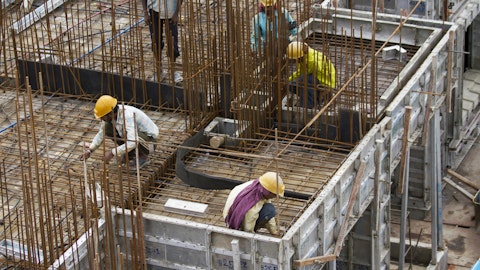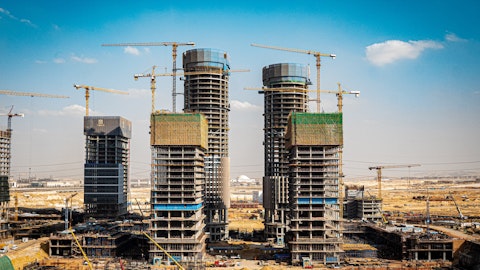Ronald Tutor: I would tell you that if I gave you a range in civil, it would be conservative at 10 to 12 after all civil G&A subject to corporate. I think the building business, as it ramps up in particular, with the prison job award, will continue to be in the 2% to 3%, with the prison having a very positive upward impact on that 2% to 3%, as the revenue progresses. That could easily be significantly higher, it won’t lower. And the specialty group should be operating at 5% to 6%. But as you are aware, our two New York specialty companies have been nothing, but struggling for the last four to five years, even with all the management replacements and restructuring. Now, we have reduced our specialty groups operations in New York only working for Tutor Perini.
I would say their specialty revenues are 25% of what they were three and four years ago. So other than the resolve of past disputes, I do not see any negative operating results starting in 2024, going forward. So, I think the specialty group, controlled as it is in New York, will limit our exposure, and generate a fairly stabilized margin in the 4% to 5% category, working only for Tutor Perini. So, the issues of litigations with their general contractors or owners will hopefully disappear. So, I think that is the safe way to put it. I think civil still has significant upside, to what I quoted. And the building business should be significantly upgraded by virtue of the lump sum bids in New York. I might add Black Construction continues to grow and do extraordinarily well, as does Lunda in the Midwest.
So everything is going extremely well forward. The concerns still remains our New York City Specialty Contractors and what we do, to reduce their impact and reduce our risks associated with our operations.
Steven Fisher: That is very helpful. Thank you, Ron.
Operator: And the next question comes from [indiscernible]. Please proceed with your question.
Unidentified Analyst: Good afternoon. Thank you for taking my question. I think I saw an 8-K earlier, just kind of going off your recent comment. I believe an executive that worked at the New York City specialty received a bonus. Can you maybe just, I think due to a strong performance, can you just give us an update on how those settlements and kind of related discussions are going and what we should kind of expect what quarter…?
Ronald Tutor: I don’t even know what you just said. Could you repeat that so I can understand it?
Unidentified Analyst: Yes, I think you put out an 8-K maybe a few months back where a bonus was paid to an executive that was in charge of managing your New York specialty contractor, business. And I kind of just wanted an update on how the dispute settlement was progressing and kind of when you kind of think the cadence of that settlement?
Ronald Tutor: When you mean that settlement, are you singling some specific? First of all…
Unidentified Analyst: Executive settlements?
Gary Smalley: I think maybe the confusion is the incentive that, you’re referring to was not paid for progress. It was really based on his other portfolio assignments prior to him taking over for specialty.
Unidentified Analyst: Yes.
Ronald Tutor: You’re talking about Ghassan Arqat’s bonus that had really nothing to do with specialty group. He just assumed that role and it was for past performance that, was extraordinary. So not to confuse one with the other, he is now in charge of both building and specialty and will be tied accordingly. And by the way, if you were asking when do, you think we’ll be out of these specialty group claims in New York, I’ll say unequivocally by the end of 2024.
Unidentified Analyst: Thank you for clarifying that. And yes, I was ultimately trying to get to when this settlement was kind of going to be resolved?
Ronald Tutor: So let’s put it this way. All our owners can’t stall us anymore. They either got court dates or we got judgments they’ve run out of appeals. They’re going to have to pay. And one by one they are.
Unidentified Analyst: That’s good to hear. I believe also during your last call, you may have mentioned that there was, I think in November, a three panel arbitration as well. That was you’re kind of expecting some more color on. Is there an update on that?
Ronald Tutor: Yes, we concluded our arbitration against the California DOT on the CHSRP [ph] Bridge project. That was concluded in November of this year. We expect the decision subject to input in April or May next year. They originally said March. Our lawyers just got clarity that it won’t be until April or May, but that will conclude that litigation, which is in the range of $100 million plus.
Unidentified Analyst: Okay. So we should get like a final judgment, let’s say in April 24 around then?
Ronald Tutor: April or May, yes ’24 without a question.
Unidentified Analyst: Great, thank you very much. And then it’s also good to kind of talk about your capital structure, a strong free cash flow generation, how you’re kind of setting some money aside. Do you have a target time frame of when you’re going to come to the market to kind of do a refinancing? And do you have a target net debt number as well?
Gary Smalley: Yes, no, we’re not going to talk any more specifics than what we said. Look, we said that we’re soon ready to launch. We’re looking at different alternatives and we’ll be doing different things, we’ll say simultaneously. So, based on when we would close, we would say, sometime early part of the year. And as far as a net debt or a debt target, look, it depends on the pace of cash. We should be able to get our debt down significantly based on what we foresee as cash collections. And we’ll see how that works. But it will be significant reduction of debt is what we’re looking at.
Ronald Tutor: Absolutely, we will significantly reduce the debt load that we’re carrying right now. And you will see in time, but look at the cash flow we generated for 2023, still going strong. And what’s coming in ’24. The first base we’re going to funnel that cash flow is to significantly reduce debt in this crazy marketplace.




